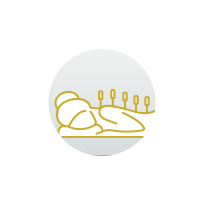
Ovarian reserve is basically defined as the quantity and quality of the egg or reproductive potential of women that highly influences their ability to conceive. In the ovaries, the loss of the ability of normal reproduction due to reduced quality or count of remaining eggs is referred to as diminished ovarian reserve (Chang, et al, 2018).
There are several factors that influence ovarian reserve, including age, genetic defects, injuries or surgeries, or aggressive medical treatments such as cancer radiation. Women who are more likely to experience diminished ovarian reserve are less likely to achieve success in in-vitro fertilization conceiving. Such women also have a higher tendency of miscarriage while conceiving through in-vitro fertilization due to lower egg quality.
Science-Backed Evidence about Ovarian Reserve
Research has shown that a biological clock is significant in ovarian reserve cases. However, it varies from woman to woman. It’s because there are many females who are less likely to conceive even in their 20s, while many have the capability to be fertile in their 40s. According to the American Society for Reproductive Medicine, women are more likely to lose ovarian reserve before reaching menopause and becoming infertile completely (Anderson, et al, 2018).
Females contain about 2,000,000 eggs at birth and this is the total amount of eggs they contain throughout. By the time puberty begins, the majority of women have about 400,000 eggs left since eggs are regularly lost. The number starts reducing more when a woman touches are the late 30s decreased to about 27,000. Most women are usually left with 1,000 eggs in their ovaries at the beginning of menopause (Jirge, et al, 2016).
Chromosomal Abnormalities and Miscarriage
The chance of ovulating a chromosomally abnormal egg enhances with the passage of age, which ultimately leads to an increased risk of miscarriage and lower fertility. An embryo is less likely to implant or unable to develop thoroughly when the fertilized is of poor quality. It eventually leads to miscarriage. Younger women can also have low-quality eggs, while older women are more likely to do so. It’s a frequent misperception that having regular menstrual cycles leads to the fact that the ovarian reserve is normal and a woman will be able to get pregnant. This is not always the case, however, as many women with regular periods may still experience difficulties getting pregnant if their ovarian reserve is low (quality and quantity of egg) (Fett, et al, 2019).
Causes of Diminished Ovarian Reserve
Various causes decrease the quality of eggs and lower the chances of fertility, including
-
Alcohol, drugs, and cigarette smoking
-
Aggressive medical treatments (cancer radiation)
-
Genetic abnormalities (X chromosome abnormalities, Fragile X)
-
Ovarian surgery, including endometriosis
-
Environmental toxins
-
Stress
-
Inflammation
Screening Tests
A group of tests is needed to reach an ultimate outcome related to ovarian reserve because a single test cannot predict the cause and pregnancy potential. Fertility specialists can interpret these screening tests perfectly because the age factor is also involved in the results of these tests. Here are some tests including an inspection on 2nd or 3rd day of the menstrual cycle
-
FSH (follicle-stimulating hormone) Screening
A dominant follicle in the ovary is induced to develop and secrete estrogen by the hormone FSH. FSH is essentially made by the anterior pituitary gland in the brain. If the results of the screening show a higher level of FSH, it may signify the attempt of the brain to make up for older-behaving ovaries. FSH levels can often change from month to month (Ripley, et al, 2015).
-
Estradiol Screening
Advanced follicular recruitment may cause a high basal estradiol level. A falsely low FSH level can result from high estradiol levels that prevent the pituitary from secreting FSH. Since falsely low FSH levels can be misinterpreted, simultaneous testing of both estradiol levels and FSH is crucial.
-
AMH (anti-Müllerian hormone) Screening
The levels of FSH vary from cycle to cycle and in this case, serum anti-Müllerian hormone seems to be highly reliable with its minimal variability between menstrual cycles. Also, it can be analyzed at any point during the menstrual cycle. Basically, the purpose of the AMH level is to understand the number of potential eggs present in the follicle. This number gradually decreases over age and can predict the early drop in ovarian function. Hence, this screening test is used to analyze ovarian function (Podfigurna, et al, 2018).
-
Antral follicle count (AFC)
In the ovaries, the total number of small follicles is referred to as antral follicle count (AFC), which is observed with transvaginal sonography. Throughout the menstrual cycle, this screening test can be used to observe AFC, which can vary from month to month (Chang, et al, 2018).
Acupuncture Supports Egg Quality- How?
Acupuncture is basically a sort of alternative medicine which is used to treat several health-related problems by inserting thin needles into the body. One of the most significant uses of this medicine is to improve egg quality. It is well-known worldwide due to its effectiveness in reproductive outcomes in women. It modulates endogenous physiological mechanisms, including cytokine levels and modulation of neuroendocrine factors, to improve women’s reproductive disorders. The blood flow is enhanced to the reproductive organs by acupuncture. It eventually provides blood flow to the ovaries, which helps boost the quality of the egg and fertilization. Through acupuncture, women undergoing IVF can improve reproductive outcomes and ovary reserve. Research has shown that it has shown effectiveness in women to improve clinical pregnancy. However, there are complications associated with this form of treatment, including tissue injury, bacterial infections, scarring, and edema. It might be due to poor work while inserting needles. Hence, it is necessary to get it done by ultimate professionals. If you are one of those suffering from poor egg quality or are unable to conceive, book an appointment now to improve your egg quality through a licensed acupuncturist
References
-
Chang, Y., Li, J., Li, X., & Liang, X. (2018). Egg quality and pregnancy outcome in young infertile women with diminished ovarian reserve. Medical science monitor: international medical journal of experimental and clinical research, 24, 7279.
-
Anderson, R. A., & Telfer, E. E. (2018). Being a good egg in the 21st century. British medical bulletin, 127(1), 83.
-
Jirge, P. R. (2016). Poor ovarian reserve. Journal of human reproductive sciences, 9(2), 63.
-
Fett, R. (2019). It Starts with the Egg: How the Science of Egg Quality Can Help You Get Pregnant Naturally, Prevent Miscarriage, and Improve Your Odds in IVF. Franklin Fox Publishing LLC.
-
Ripley, M., Lanes, A., Léveillé, M. C., & Shmorgun, D. (2015). Does ovarian reserve predict egg quality in unstimulated therapeutic donor insemination cycles?. Fertility and Sterility, 103(5), 1170-1175.
-
Podfigurna, A., Lukaszuk, K., Czyzyk, A., Kunicki, M., Maciejewska-Jeske, M., Jakiel, G., & Meczekalski, B. (2018). Testing ovarian reserve in pre-menopausal women: why, whom and how?. Maturitas, 109, 112-117.










